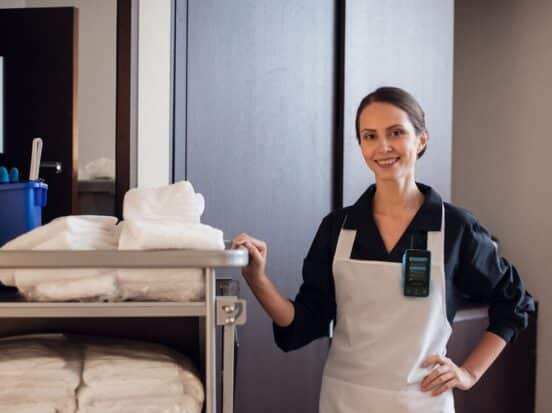Early afternoon at any large hotel property is often the busiest and most stressful for staff and management. It’s when checkout and check-in times collide, and guests start lining up at the reception desk to inquire about the status of their rooms. Behind the scenes, the hotel staff is on overdrive, and any issues can impact this critical turnover time.
Key Highlights:
- Communication breakdowns drain revenue: Outdated walkie-talkies, language barriers, and limited communication access cause delays in room readiness and maintenance, costing large hotels hundreds of thousands annually.
- Frontline teams are under-connected: Many housekeeping and maintenance workers lack direct communication tools, forcing them to rely on others to relay messages—creating inefficiencies, distractions, and missed issues.
- Smart radios solve the gap: Modern workforce communication platforms enable instant push-to-talk, text, photo, and video sharing with real-time AI translation, ensuring all staff can communicate across languages and roles.
- Transformational results: Hotels that deploy smart radios see improved efficiency, faster incident response, stronger safety culture, lower turnover, and real-time operational visibility across departments.
While the housekeeping teams engage little with guests, they are a frontline team whose job demands speed and safety. They are also the team that discovers unreported surprises that previous guests left. Red wine spills on the carpet, a leaking showerhead, a broken AC unit, or a clogged toilet. Once discovered, housekeeping must quickly communicate these situations to managers and maintenance, who will document them for the reception team and assign the right people to address each issue.
Because most hotel teams provide two-way radios to select staff due to budget limitations and language barriers among the housekeeping staff, team members must divert from their cleaning tasks to find someone to communicate the issue to others. Sometimes, they must walk down a hotel wing or another floor to find someone with a radio. Depending on the worker, they might need to find a bilingual co-worker who serves as an impromptu translator to communicate the news of an issue, which means multiple workers are now distracted. Because of communication delays, maintenance takes longer than it should.
Meanwhile, at the front desk, receptionists juggle greeting incoming guests while desperately trying to determine which rooms are ready. The communication maze leads to delays in room turnover, forcing the hotel to comp several rooms and upgrade others. While these may seem like minor communication breakdowns, they cascade into significant delays and undesirable costs. For a 250-room hotel, these communication failures can bleed hundreds of thousands of dollars annually from the bottom line. Across an entire chain of hotels, potentially millions.
In a hotel, challenges multiply as properties grow larger. More rooms mean more staff, departments, and complex coordination needs. This challenging coordination can often lead to workplace breakdowns, frustration, and frequent turnover. According to the U.S. Bureau of Labor Statistics, the sector experiences a 74 percent annual turnover rate, or nearly five times higher than the 12-15 percent average across other U.S. industries. This translates to approximately 6 percent of staff departing monthly, even outpacing seasonal retail turnover peaks.
Outdated communication methods exacerbate the problem. Walk through any hotel corridor, and you’ll hear the crackle of walkie-talkies, their alerts, and conversations disturbing guest peace, leaving no documentation trail for shift handovers or incident tracking. These voice-only systems, typically limited to managers and team leads, create information bottlenecks.
Because of the limited distribution of communication tools, frontline staff often resort to using their smartphones, leading to fragmented communication chains. Cross-departmental coordination becomes particularly challenging when language barriers enter the equation. The resulting inefficiencies manifest in delayed response to guest requests and potential safety oversights when critical information fails to reach the correct personnel quickly.
Hotel Communication is Ripe for Transformation
Fortunately, a significant technological shift in hospitality communications is reshaping how teams interact and collaborate. Workforce “enablement platforms” are emerging that are designed and packaged for hotel properties as digital solutions that allow organizations to put “smart radios” into the hands of every staff member, from housekeeping to valet, maintenance, reception to management.
These smart radios prioritize simplicity and connectivity, with clean interfaces that can be mastered in literally minutes. With push-to-call voice, text and send images or videos (PT3) over cellular LTE, teams can work faster and more efficiently, saving time in an industry where every minute matters.
Perhaps most attractive is the ability to instantly communicate between staff members regardless of their preferred language with real-time AI translation. For instance, a housekeeping team member can send messages in Spanish directly to others who receive the message in English. When issues arise, team members with access to the platform can choose to send a single message from the room and attach a short video or photo highlighting the problem to alert maintenance and housekeeping management.
Once notified, maintenance team supervisors deploy the closest available team member to address the issue quickly. With smart radios in every employee’s hands, hotel team managers gain real-time visibility into operational bottlenecks and can instantly redirect staff to address emerging issues while creating a system of record.
The smart radios also include a silent panic button that staff can activate during emergencies without alarming guests. Management can also send audible alerts to all staff when situations require quick evacuation assistance.
This technology represents more than just an operational upgrade – it’s a seamless shift to streamline hotel operations.
Organizational Impact of Smarter Technology
When properties deploy modern communication platforms and smart radios, the move activates a profound cultural transformation beyond operational efficiencies. When every worker has a voice – literally and figuratively – the entire property shifts toward greater engagement and accountability.
Staff members who previously felt isolated by language barriers become engaged team members, leading to increased job satisfaction and reduced turnover, minimizing related costs. Safety protocols become more robust as open communication enables faster incident reporting and response. The financial impact is equally compelling.
Deploying smart radios impacts not just operations but the very culture of a property. The return can be measured in reduced turnover costs and improved worker retention. By equipping all workers with devices or their companion mobile apps, hotels gain the tools to identify bottlenecks, improve response times, and create a more connected workforce. Every minute your team spends with outdated technology puts your property at risk of falling behind guest expectations and competitor service levels. The hospitality industry is rapidly evolving, and you have an opportunity to ensure your communication technology evolves with it.
This contributed article by Kevin Turpin, weavix founder and CEO, was reprinted with generous permission by Hospitality Technology.
 Kevin Turpin
Kevin Turpin 
